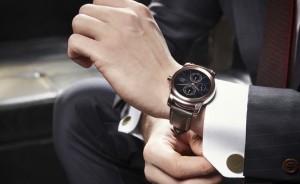Forget the fitness tracking, media playback, remote voice controls and calling support. The real allure — at least when it comes to the world of business — is instant access to your most important emails, messages and notifications. In a high-profile corporate world, it actually makes a whole lot of sense to pick up a smartwatch. If you’re constantly on-the-go, traveling or just moving around a lot a smartwatch allows you to pair up with your smartphone and peek at important content at a moment’s notice. This means, you don’t have to stop whatever you’re doing to read that email from your account exec or secretary.
Of course, the introduction and rising popularity of such devices brings to light some extremely important questions. Are these things safe enough to handle corporate data? Are smartwatches acceptable for BYOD scenarios? Better yet, how easy is it for an outside party to gain access to sensitive information?
Let’s take a closer look to find out.
What Do Smartwatches Do?
 Most — if not all — smartwatches will pair directly with a mobile device or smartphone and synchronize a select set of data. Information can be passed back and forth between the two devices from a whole slew of channels, including text messages, email, apps and the phone dialer. Furthermore, some smartwatches are standalone in that they include mobile connectivity support and do not need a smartphone for wireless access. Standalone smartwatches may also make and take calls directly from the device — without being paired to another device.
Most — if not all — smartwatches will pair directly with a mobile device or smartphone and synchronize a select set of data. Information can be passed back and forth between the two devices from a whole slew of channels, including text messages, email, apps and the phone dialer. Furthermore, some smartwatches are standalone in that they include mobile connectivity support and do not need a smartphone for wireless access. Standalone smartwatches may also make and take calls directly from the device — without being paired to another device.
You can certainly synchronize, view and edit corporate data on a smartwatch. That means, all of your emails, text messages and more will be compatible. Even your corporate calendar and contact information is accessible, depending on the device(s) employed in the equation. By that, we mean that certain devices are not compatible. Windows Phone handsets, for example, are not compatible with as many smartwatches as their Android brethren. iOS is almost as limited, but not for long thanks to Apple.
Security for Smartwatches
For the most part, the extent of available security largely depends on the device in question. Android Wear smartwatches, for example offer a couple different security measures to help protect device data. On the other hand, generic smartwatches, that you can purchase through sites like Amazon may not. Don’t worry, the recently announced Apple Watch has a few security measures of its own, as well.
Most devices allow you to lockdown your data — and the functionality of the device itself — with a four digit passcode. This works great, but there’s a downside. Unlike traditional smartphones, it’s common among smartwatches that they do not timeout after a certain period of time. Instead, they will lock automatically when they are out of range of a paired phone. In addition, the PIN lock feature doesn’t always protect against USB debug access, especially on Android devices. Of course, third parties can’t get root access this way, but they can still peek at unencrypted files and data if they know what they’re doing.
Some smartwatch models allow you to use biometric data (read:fingerprints) to gain access, or additional code entry sequences such as a pattern or gesture lock.
Of course, even with all these security options, firms have claimed it’s possible to hijack data being sent from a smartwatch to a smartphone, though this requires the hackers to bypass a strict set of limitations.
 We’re not going to sort through the long list of smartwatches and describe which ones have great security and which ones don’t. To be honest, that’s something you should be paying attention to anyway when you choose a smartwatch. Just know that these problems exist, and that means security may not be top-notch. In some corporate scenarios this may not be a problem. In others — especially those that deal in highly sensitive data — a smartwatch may be entirely out of the question, for now.
We’re not going to sort through the long list of smartwatches and describe which ones have great security and which ones don’t. To be honest, that’s something you should be paying attention to anyway when you choose a smartwatch. Just know that these problems exist, and that means security may not be top-notch. In some corporate scenarios this may not be a problem. In others — especially those that deal in highly sensitive data — a smartwatch may be entirely out of the question, for now.
It’s worth noting; it remains to be seen how Apple is going to handle this aspect of their upcoming Apple Watch. It’s entirely possible they could handle security in a much better way, allowing for a more ideal BYOD smartwatch for the corporate world, we’ll see.
